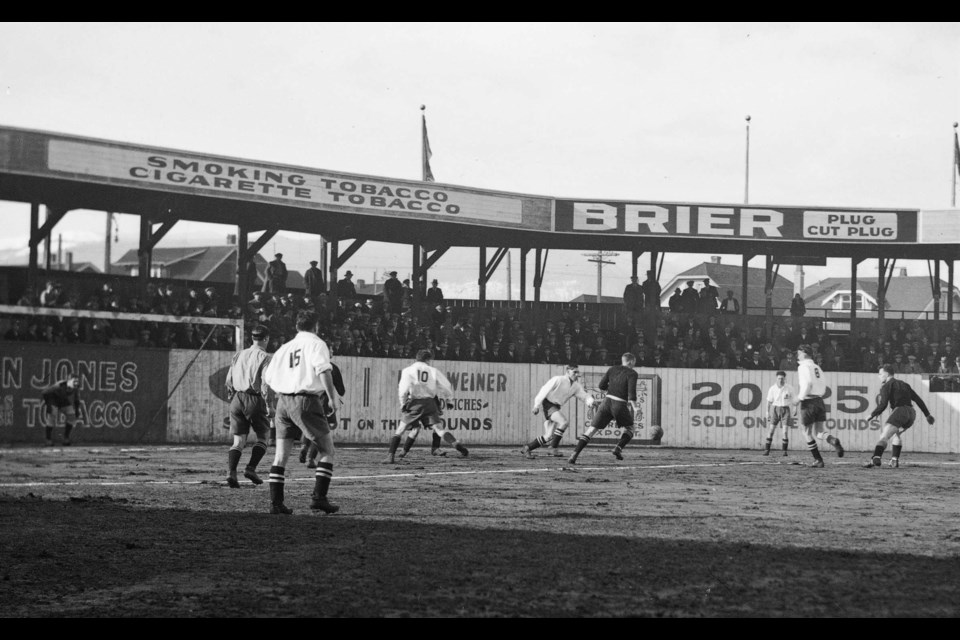Soccer. Football. The beautiful game.
Something similar to it has been played for thousands of years, though the modern game has roots much more recent in England where the first set of official rules and football associations were set in the 19th century.
The game arrived in what is now known as Canada while it was still a territory of the United Kingdom, as settlers brought it over as they immigrated to North America and spread it across the continent (the was founded in Toronto).
Its popularity grew in Â鶹´«Ã½Ó³»as well, which boomed in population in the 1900s, and while hockey, baseball and other sports have equaled or surpassed it, it's remained a regular part of the city's sporting world.
1.
Burnaby's Christine Sinclair is one of the most famous soccer players Canada has ever produced, and if the Canadian men hadn't had the recent success she'd probably be the most famous active Canadian soccer player.
Often she's noted as the highest-scoring woman of all time, but that hides the fact . While Cristiano Ronaldo is often noted as the all-time highest-scoring player in international soccer, he's only the highest-scoring man, with 118 goals (as of the time this was written).
Sinclair's way out in front of the Portuguese star, with 190 international goals. The two are actually in equal in one category: goals per game. The difference is Sinclair has played 310 games for Canada, while Ronaldo hasn't cleared 200.
2. Keeper Craig Forrest was the first Canadian to play in the English Premier League
Founded in 1992, the English Premier League is often considered the top league in the world (unless you count the Champions League as its own league), and in that first season Coquitlam's Craig Forrest was a part of it, becoming the first Canadian to play in the league.
In fact, he was the first North American to play in the league. Forrest was a member of Ipswich Town at the time and was considered the best Canadian soccer player of the era. He had a long career in the EPL, playing for Chelsea and West Ham as well. And for team Canada he was the go-to goalie for more than a decade, including in 2000 when he backstopped the undefeated team to the , one of only two Canada has won.
3. Canada's first professional game was in Â鶹´«Ã½Ó³»between two local teams
Over the past several decades professional soccer teams in Â鶹´«Ã½Ó³»have been few and far between, but go back 100 years, and they were a little more common.
In 1910 the professional scene in Canada was growing, and in Â鶹´«Ã½Ó³»(which was on the block Yaletown Park now is) played host to the first match between two pro teams. It was the Callies versus the Rovers, with the Callies taking it 3-0. The league they were in folded shortly after.
4.
Canadian superstar (arguably the most famous Canadian soccer player ever, now) Alphoso Davies had a long road to get where he is now. Born in 2000 to Liberian refugees living in a refugee camp in Ghana, the family made their way to Canada in 2005.
Just 10 years later Davies moved to Â鶹´«Ã½Ó³»to join the Â鶹´«Ã½Ó³»Whitecaps youth program, where he excelled and quickly rose the ranks, signing a contract and playing professionally at 15 years old. As a teenager, he joined the MLS team and was starting games in front of thousands of fans.
And for two years of that wild ride he was a student at a Metro Â鶹´«Ã½Ó³»Public School. Burnaby Central Secondary School and the Whitecaps had partnered as part of the youth program, and Davies was a highschool student there from 2015 to 2017.
5.
Firefighters are known to be in rather good shape, so maybe it makes sense that the 1961-62 Â鶹´«Ã½Ó³»Firefighters men's soccer team did so well.
The amateur team were a tight-knit group, working together and playing in the Pacific Coast Soccer League. In 1961-62 they were beating teams in league and cup play all season and won a spot in the Kennedy Cup, a tournament for amateur teams from the US and Mexico.
The Firefighters were able to come through in a 2-1 final against a Mexican team. They then went home and added a provincial championship later the same season (and went on to win a Canadian championship later in the 60s).




